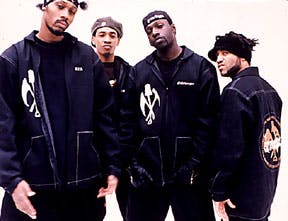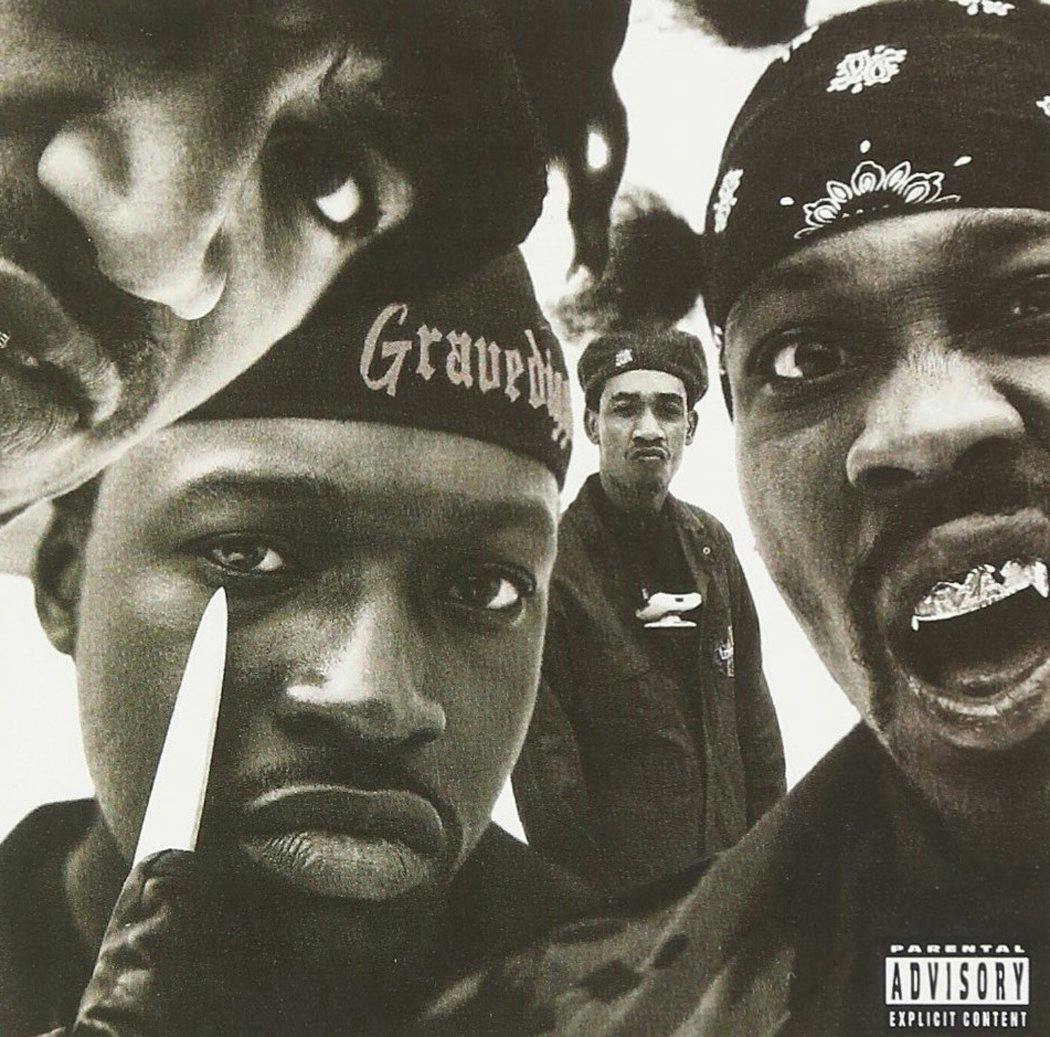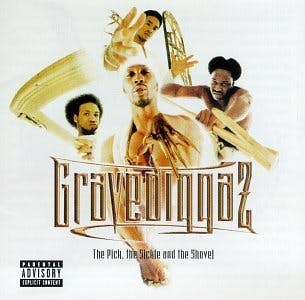
Gravediggaz: The Gruesomely Grotesque Glory of Rap's Scariest Innovators
Gravediggaz: The Gruesomely Grotesque Glory of Rap's Scariest Innovators
Published Fri, October 30, 2020 at 9:00 AM EDT
Black horror has become a hot commodity.
That is, creative works steeped in horror that is presented from a distinctly African or African-American perspective. Jordan Peele and Misha Green's high profile projects have certainly kicked down walls, in that respect: Green's hit HBO horror/sci-fi series Lovecraft Country has earned raves for its depiction of the genre's tropes through a distinctly Black lens; and likewise, Peele's hit movies Us and Get Out broke ground at the box office for horror.
At the dawn of the 1990s, Black horror was fairly limited in mainstream pop culture. Campy, low-budget fare like Def By Temptation and Eddie Murphy's turn in the Wes Craven-directed misfire A Vampire In Brooklyn notwithstanding, Black horror stories were few and far between. Hip-Hop had seen the mainstreaming of gangsta rap, but there wasn't exactly a horror bent in most of the music.
It was into that pop culture landscape that Gravediggaz emerged.
Prince Paul had enjoyed tremendous success in the late 1980s; both as member of Stetsasonic and as a hit producer for artists like Queen Latifah, 3rd Bass, and, most notably, De La Soul. But by the early 1990s, the Amityville, Long Island native had grown bitterly disillusioned with the music industry. Frustrated by the murky reaction to De La Soul's sophomore album De La Soul Is Dead and his own inability to get around a bad production deal for his own Dew Dew Man label, Paul began working on music that was quite the departure from De La-esque quirks.

A Staten Island-based rhymer named who went by the name of Prince Rakeem was also experiencing industry frustration.
"I met RZA during the time I made 3 Feet High And Rising," Paul explained to Entertainment Weekly last year. "That's when he was Prince Rakeem. We made demos together and I thought he was an amazing lyricist, but I lost contact with him. When I started coming up with the idea for the Gravediggaz at the end of 1990, he was one of the first people I thought of."
"He reached out to me and said that there's a few other MCs he thought was great, and it'd be good if we all met each other and create something," RZA said. "We met on Long Island at his studio. I don't recall which meeting we came up with Gravediggaz — I don't like doing no type of self praise, so I can't say if I came up with the idea or not. But I just know I was in a dark spot in my life, and the Gravediggaz really fit the attitude and the mentality as an artist that I was in."
Legendary Legacies
Frukwan had been in Stetsasonic with Paul, and another Long Island-raised emcee; Poetic was a refugee from Brothers Grym, a trio he'd formed with his brothers Brainstorm and E# in 1987. He'd now become another solo Tommy Boy act that had gotten lost in the shuffle and briefly wound up on Paul's Dew Dew Man.
The quartet adopted horror-themed monikers for their new personas: Paul became The Undertaker; Poetic was rechristened the Grym Reaper in a tongue-in-cheek reference to his former group. Frukwan was now The Gatekeeper, and Rakeem came upon The RZArector, and liked the sound of it so much, he shortened it for his full-time rap moniker; The RZA.
It was Gee Street that finally signed the group, after a brief flirtation with Eazy E and Ruthless Records. Working on music for this new project gave Prince Paul an opportunity to pour his darkest feelings into the production, and his bandmates followed suit, offering lyrics that were dark, disturbing and often hilarious. Shock tactics in rap weren't new; and Geto Boys had gained tremendous notoriety for twisted tales about murder in mayhem in their raps. Gravediggaz seemed to be a Hip-Hop take on Tales From The Crypt complete with a campy tone that was both over-the-top and organic.
DROP YOUR EMAIL
TO STAY IN THE KNOW
While Paul had been shopping the debut album from Gravediggaz, RZA had now taken a quantum leap in his career, as his Wu-Tang Clan landed on Loud Records in late 1992 and dropped its first single in early 1993. When Enter The Wu-Tang: 36 Chambers arrived in fall of that year, RZA and Wu were suddenly hot commodities. In the meantime, Gravediggaz finally got off the ground and their debut album 6 Feet Deep would be released in 1994.

The group's first official single, "Diary Of A Madman" landed in video rotation and pushed 6 Feet Deep to gold status, less than a year after Wu-Tang Clan made RZA one of the most famous rapper/producers in Hip-Hop. While the single put Gravediggaz on the mainstream radar, Paul has had to clarify the song's genesis, as the official credit lists Paul, RZA and producer RNS for the production.
“Alright, so RNS gets credit for the record. RZA gets credit ’cause it went through RZA," Paul explained in a 2018 video for Tracklib. "And me, ’cause I put the whole record together: programmed the drums, put the court pieces and stuff in it. But when you look at the credits, everybody goes ‘Yeah, RZA produced it, but Paul had nothin’ to do with it.’…it’s obviously a Prince Paul production, you can hear how it’s done. Nobody makes stuff like that, at least during that time.”
Paul felt his production on the debut Gravediggaz album was the best work of his career. And the same knack for thematic songs that he'd mined so well on De La Soul records resurfaced in bloody fashion on 6 Feet Deep. His sense of humor was a cornerstone of the group's approach, perhaps most notoriously showcased on the "advice" song "1-800 Suicide." But by the time Gravediggaz finally debuted, Wu-Tang had become RZA's priority. And RZA's rising stardom shifted the dynamics within Gravediggaz. By the time the group was set to record a follow-up to 6 Feet Deep, much had changed.
1997s THE PICK, THE SICKLE AND THE SHOVEL was more of a RZA-helmed affair, with Prince Paul taking a smaller role within the group.
The album moved away from macabre humor, and towards more topical concerns and Wu-esque production, mostly from RZA affiliates like 4th Disciple. Paul's lack of involvement, along with RZA's ever-growing superstardom and diversifying interests, soon proved to be too much for Gravediggaz to sustain.

Nonetheless, Poetic seemed committed to the pioneering group's legacy. His frustration with the industry's lack of interest in the kind of conceptual approach the Gravediggaz had become known for was evident in his outlook.
"Now that it’s mainstream, the companies have more influence over the artistic integrity of what they’re going to let flourish," Poetic told Miguel D'Souza. "The radio has a certain format now. Some DJs won’t play shit unless you can dance to it. They don’t care about music or concept, or consciousness... nothing! Strictly dance music, stuff they can dance to shake their butts to, whatever, whatever. If you know that the only way you’re going to get your stuff played on the radio is to create something like that, as a young, up and coming artist, you’re going to see more and more that they lean towards that side. Once that process begins, it filters out and dilutes the whole Hip-Hop forum, to the point where on the radio over here, you only hear the same type of music. It’s the same tracks and the same slangs, same clothing items, monetary and material things to talk about - with different voices. Big deal. Same shit, you know what I mean?"
Poetic and Frukwan remained close collaborators as Gravediggaz fractured and splintered from its original core. It emboldened Poetic.
"As far as the last Gravediggaz record, I put a lot of input into it, only because I’ve been working on a solo album," Poetic explained in 1997. "Which even after sacrificing 5 or 6 different songs and lyrics that I had for the Gravediggaz album, I still have like 7 songs that are already recorded."

It’s the same tracks and the same slangs, same clothing items, monetary and material things to talk about - with different voices. Big deal."
- Poetic of Gravediggaz (BOMB HIP-HOP interview)
Poetic would be diagnosed with colon cancer in 1999. With doctors giving him a projected three months to live, he dealt with his diagnosis by focusing on his music. He continued working and creating for the next few years; Poetic died in 2001. Nightmare In A-Minor, the final Gravediggaz album, was released in 2002, featuring Poetic and Frukwan, along with DJ Diamond J.
"We all knew that he had this illness, and that it was catching up to him, but still he kept fighting it because of his love for his music," Frukwan would share a month after Poetic's death. "That was the most important thing to him besides his health and his family. It was like he always meant to leave something behind because he already knew the situation and we already knew the situation. We were all aware that his situation had stretched beyond the limitations that were placed upon him by the doctors."
Gravediggaz carved a distinct niche in Hip-Hop for bizarre storytelling and dark humor; as well as furthering a standard for album conceptualism and production that Prince Paul has been sustaining for decades since. The crew also introduced a heady mix of consciousness into the darker elements, something that, when cast alongside contemporary art like Get Out and Bad Hair, seems to be a touchstone. Out of step with its time, but deserving of the stature its earned in the years since, Gravediggaz has a legacy that's more than great.
It's bloody brilliant.




